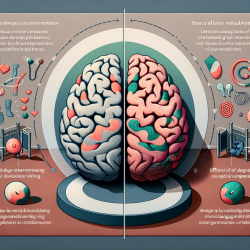As a dedicated practitioner in speech-language pathology, understanding the diverse perspectives of families dealing with Autism Spectrum Disorder (ASD) is crucial for providing effective and empathetic care. The study "Parental Beliefs and Feelings about Autism Spectrum Disorder in Iran" offers valuable insights that can help enhance your practice. Let’s delve into the key findings and their implications for your work.
Understanding Cultural Contexts
The study emphasizes that parental beliefs about ASD are deeply rooted in cultural contexts. For Iranian parents, these beliefs significantly influence their understanding of ASD and the interventions they seek for their children. This underscores the importance of cultural competence in your practice. Here are some key takeaways:
- Early Concerns: Iranian parents often notice signs of ASD before their child’s second year. This early detection is crucial for timely intervention.
- Social Communication Issues: Many Iranian parents identify social communication problems as the primary concern. Recognizing this can help tailor your assessments and interventions more effectively.
- Cultural Explanations: The study reveals that Iranian parents often attribute ASD to maternal stress, spiritual factors, or environmental influences. Understanding these beliefs can help you communicate more effectively with parents and build trust.
Implications for Practice
To integrate these insights into your practice, consider the following strategies:
- Develop Cultural Competence: Educate yourself about the cultural backgrounds of the families you serve. This will help you understand their perspectives and provide more empathetic care.
- Engage in Open Communication: Encourage parents to share their beliefs and concerns. This can lead to a more collaborative approach to intervention.
- Tailor Interventions: Use culturally informed approaches to design interventions that resonate with the family’s beliefs and values.
Encouraging Further Research
The study highlights the need for more culturally informed research on ASD. As practitioners, staying updated with the latest research and contributing to it can help improve outcomes for children with ASD globally.
To read the original research paper, please follow this link: Parental Beliefs and Feelings about Autism Spectrum Disorder in Iran.










